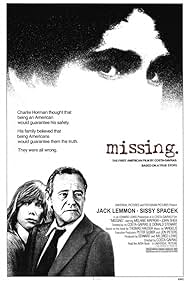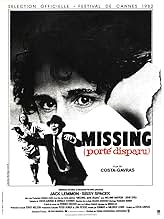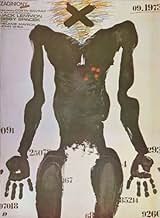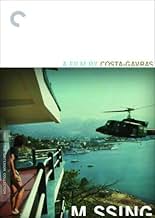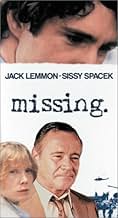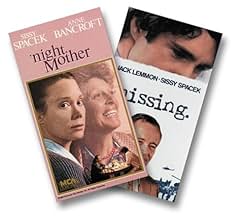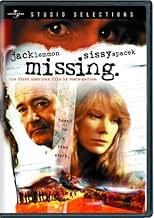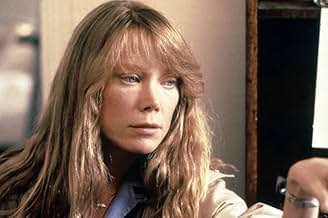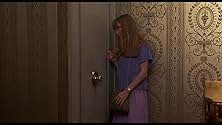When an idealistic American writer disappears during the Chilean coup d'état in September 1973, his wife and father try to find him.When an idealistic American writer disappears during the Chilean coup d'état in September 1973, his wife and father try to find him.When an idealistic American writer disappears during the Chilean coup d'état in September 1973, his wife and father try to find him.
- Won 1 Oscar
- 12 wins & 23 nominations total
Martin LaSalle
- Paris
- (as Martin Lasalle)
Storyline
Did you know
- TriviaDuring the Pinochet dictatorship, which ran from 1973 to 1990, this picture was banned in Chile.
- GoofsIn the scene where Jack Lemmon is at the State Department early in the movie trying to get information about Charlie, there is the presidential portrait of Richard Nixon on the wall in the background and a more personal photo of him on Marine One on the credenza behind the desk. That photograph, with fingers in the V-peace sign, was taken upon his final departure from the White House in 1974 and could not have been on someone's desk in 1973.
- SoundtracksMy Ding a Ling
(1952)
Written by Chuck Berry (uncredited)
Performed by Chuck Berry
Courtesy of All Platinum Records, Inc.
Featured review
Accomplished Greek-French filmmaker Costa-Gavras has a compelling way of bringing the emotional resonance out of stories with overtly political themes. He hits the mail on the head with this searing indictment of American involvement in the 1973 military coup that ejected Allende from power in Chile. Facts are not discretely presented, even the country in which the story takes place is not disclosed (except for specific references to the cities of Santiago and Vina Del Mar). Yet, Costa-Gavras creates an atmosphere of palpable tension that doesn't let up in this 1982 film, and the unraveling mystery at the heart of the movie echoes the unsettling political situation surrounding the characters.
Adapted by Costa-Gavras and Donald Stewart from Thomas Hauser's non-fiction book documenting the true case, the plot focuses on American expatriate Charles Horman whose sudden disappearance in the days after the Pinochet coup brings together two familial adversaries, his wife Beth and his father Ed, who has flown in from New York. Charles and Beth had been leading a vagabond existence with his work in children's animation and their relatively passive support of Allende's reform measures. Charles' back story is revealed in carefully constructed flashback episodes that show him to be curious about the presence of U.S. military personnel in the area. Once he disappears, Ed and Beth seek help from the U.S. Consulate but face a seemingly insurmountable wall of bureaucracy. Frustrated, Ed, a highly conservative Christian Scientist, lashes out at Beth for what he considers her undesirable influence over his son. However, as they absorb the scope of the violence and the culpability of the U.S. government, they bond intractably toward their objective of finding Charles.
For once, Jack Lemmon, unafraid to convey his character's prejudices, is able to use his neurotically coiled energy in a suitable dramatic role as Ed. The result is a startlingly raw performance that ranks among his best. Sissy Spacek is terrific as Beth, though her character does not experience as big an arc of self-revelation. In the elliptical flashback role of Charles, John Shea provides solid support, as do Janice Rule as a political activist and a number of familiar TV faces - Melanie Mayron as friend Terry and David Clennon as U.S. consul Phil Putnam, both from "thirtysomething", and Joe Regalbuto, Frank from "Murphy Brown", playing another Frank, a possible victim of the coup. There are unfortunately no extras with the 2004 DVD.
Adapted by Costa-Gavras and Donald Stewart from Thomas Hauser's non-fiction book documenting the true case, the plot focuses on American expatriate Charles Horman whose sudden disappearance in the days after the Pinochet coup brings together two familial adversaries, his wife Beth and his father Ed, who has flown in from New York. Charles and Beth had been leading a vagabond existence with his work in children's animation and their relatively passive support of Allende's reform measures. Charles' back story is revealed in carefully constructed flashback episodes that show him to be curious about the presence of U.S. military personnel in the area. Once he disappears, Ed and Beth seek help from the U.S. Consulate but face a seemingly insurmountable wall of bureaucracy. Frustrated, Ed, a highly conservative Christian Scientist, lashes out at Beth for what he considers her undesirable influence over his son. However, as they absorb the scope of the violence and the culpability of the U.S. government, they bond intractably toward their objective of finding Charles.
For once, Jack Lemmon, unafraid to convey his character's prejudices, is able to use his neurotically coiled energy in a suitable dramatic role as Ed. The result is a startlingly raw performance that ranks among his best. Sissy Spacek is terrific as Beth, though her character does not experience as big an arc of self-revelation. In the elliptical flashback role of Charles, John Shea provides solid support, as do Janice Rule as a political activist and a number of familiar TV faces - Melanie Mayron as friend Terry and David Clennon as U.S. consul Phil Putnam, both from "thirtysomething", and Joe Regalbuto, Frank from "Murphy Brown", playing another Frank, a possible victim of the coup. There are unfortunately no extras with the 2004 DVD.
Details
- Release date
- Countries of origin
- Languages
- Also known as
- Vermisst
- Filming locations
- Acapulco, Guerrero, Mexico(as Vina del Mar)
- Production companies
- See more company credits at IMDbPro
Box office
- Budget
- $9,500,000 (estimated)
- Gross US & Canada
- $14,000,000
- Gross worldwide
- $14,000,000
- Runtime2 hours 2 minutes
- Color
- Aspect ratio
- 1.85 : 1
Contribute to this page
Suggest an edit or add missing content

